Dr. Abdus Salam: The Coffee House of Lahore By K K Aziz
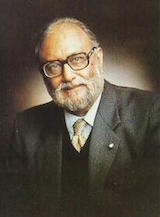
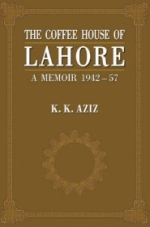 Among my contemporaries and colleagues in Government College, companions in the Coffee House of Lahore and friends at these places and elsewhere there is only one genius, and that was Abdus Salam.
Among my contemporaries and colleagues in Government College, companions in the Coffee House of Lahore and friends at these places and elsewhere there is only one genius, and that was Abdus Salam.
Salam was the son of Chaudhri Muhammad Husain, a schoolteacher of Jhang and Hajirah who belonged to Faizullah Chak near Batala Muhammad Husain was a jat and Hajirah a Kakkezai. Now I know that Faizullah Chak was an almost exclusively Kakkezai village because my mother’s mother belonged to it and the family had lived there since time unknown. The Kakkezais were a close-knit, community, mixed well among themselves, and formed a close network of relationships within the tribe. The problem of working out or tracing a relationship in Muslim (and non-Muslim Indian) families is that the genealogical trees concern themselves with males alone. Therefore I presume with some justification and optimism that Hajirah was a member, however distantly placed, of my grandmother’s larger family. That makes Salam a cousin of mine; it doesn’t matter at how many removes.
Born in 1926 and educated at the Government School and Government Intermediate College, Jhang, Government College, Lahore, and St. John’s college, Cambridge, he made it a habit to excel in very examination he took. He stood first in 1940 in the matriculation examination of the Punjab University and again in 1942 in the F .Sc. examination. He joined the Government College, Lahore, in 1942 to study mathematics A and B and honours in English. He graduated in 1944 winning every laurel within sight: 300 out of 300 marks in Mathematics, 121 out of 150 in English honours, standing first in the University and breaking all records in the B.A. examination.
In 1946 he took his M.A. in Mathematics, scoring 573 marks out of 600, and topping the list. In September 1946 he left for Cambridge on a Punjab Peasant Welfare Fund Scholarship to study Mathematics at St. John’s College as an undergraduate.
If in India his academic career had been brilliant, in Cambridge it was dazzling. He got a first both in his Preliminary in 1947 and Part II in 1948, and then gave up Mathematics for the time being because on the higher level it could not be fully mastered without a good knowledge of physics.
In an unprecedented performance he read Physics for one year and took its Part1 and II together in 1949; scoring a first and surprising even his teachers. His scholarship was extended for two years (it should have been three years) to work for his Ph.D.
He came to Pakistan in the summer, married Ummatul Hafeez, And returned to Cambridge in 1949, deciding to tackle theoretical physics for his doctoral thesis.
The year 1951 was the time for him to harvest the fruits of his labour. He completed his thesis (though he could not get his Ph.D. till the following year because the University statutes required that the candidate spent nine terms before being eligible to receive his doctorate), won the Smith Prize, was elected Fellow of his College, and named Fellow of the Institute of Advanced Studies at Princeton University. Pending the award of his degree he came to Lahore and was appointed Professor of Mathematics and Head of the Department of Mathematics at both the Government College and the Punjab University. In 1952 he went to Cambridge for his viva voce and to receive his doctorate. His problems began almost as soon as he took up his job at the Government College. Instead of honouring him for his brilliant achievements, he was humiliated by the College and the education Department. He was not given an official residence, as was his right. Temporarily he stayed with Qazi Muhammad Aslam, the professor of philosophy at the College, and continued his efforts to get a house allotted to himself. Disappointed with the indifferent attitude of the officials he asked for an interview with the Minister of Education, Sardar Abdul Hameed Dasti. Salam told him that they had a family to accommodate and was entitled to a residence. As Salam told me, the Minister brought the interview to an end by refusing any help and declaring; “Pugdi e te kam karo warna jao” (if it suits you, you may continue with your job; if not, you may go). Salam was so frustrated that he was considering a resignation; but soon a house was allotted for him and he stayed on.
But that was just the beginning. A little later, the Principal, Professor Sirajuddin, asked him to do something to earn his keep besides his teaching. He was given three choices: to act as Superintendent of the Quadrangle Hostel or to supervise the college accounts or to take charge of the college football team. Salam chose to look after the footballers occasionally. At the end of this chore at the University Grounds, he would drop in at the Coffeehouse and tell me about his bitterness on being forced to waste his time. A man who had worked 14 hours a day at Cambridge as a student had now hardly any time to read new literature on his subject, and the facilities in the college laboratory were dust and ashes compared to the Cavendish Laboratories where he had worked as an undergraduate and a doctoral student. It was not difficult to take the gauge of Salam’s frustration. A more serious contretemps occurred in the Christmas holidays of the same years. Professor Wolfgang Pauli, the 1945 Nobel Laureate of physics and a friend of Salam, was visiting Bombay on the invitation of the Indian Science Association. He sent a telegram to Salam wishing to see him and asking him if he could come to Bombay. Salam, who had been craving to talk to a peer in his field, at once left for India and spent a week with Pauli: (Till that time travelling to India did not require long planning or a visa), On his return to Lahore he was charge sheeted for absenting himself from his station of duty without prior permission. Salam was shocked. He was used to European freedom of movement and had been part of Pakistani bureaucratic setup for a mere three months. The Principal made so much fuss about the incident that Salam feared that he might be dismissed from the education service. At this point S.M. Sharif, the Director of Public Instruction of the Punjab, intervened and the period of Salam’s absence was treated as leave without pay. In March 1953 I became a colleague of Salam when I was appointed head of the department of political science at the College. (This high office came my way by an unexpected turn of events.)
In March 1952 I had entered the education service as a junior lecturer and had been posted to Emerson College, Multan. In early 1953 Professor Abdul Hameed, head of the departments of history and political science, went away to the United Stated for one year as a visiting lecturer. As I had a special relationship with professor Sirajuddin and Professor Abdul Hameed as their favourite student, I was transferred from Multan to Lahore, and as political science was a one-man department, I became the head of the department with a seat in the heads of departments committee.).
I think it was in October 1953 that the Punjab Education Minister, Chaudhry Ali Akbar, paid an official visit to the college. The Principal and all heads of departments met to discuss several problems relating to appointments, teaching and syllabus. When the question of pass percentages of the College came up for consideration the Minister, after announcing that he was not concerned with the teachers’ formal qualifications and academic achievements but only with the percentage of students who passed the university examinations every year, made the point that however highly qualified a teacher may be he would himself issue orders for his transfer to some God forsaken place if he failed to produce a satisfactory pass percentage. And then returned to where Salam was seated, next to me, and staring at him said, “For example if Professor Salam’s pass percentage record does not please me I will send him back to Jhang.” Most of us were stunned by this crude remark. Salam was the only teacher who was named and he as the most brilliant member of the teaching staff.
When we were talking back from the meeting to the staff room Salam put his hand on my shoulder and whispered; “I have made up my mind. I must get a job somewhere abroad.” Who could blame him?
When Salam had been elected a Fellow of St. John’s College in 1951 he had accepted the honour on the condition that he would be allowed to go to Lahore and teach there and live in St. John’s only during the long vacations. St.John’s was so anxious to have him that it made an exception and accepted his condition. This was a measure of Salam’s love for the Government College; he was prepared to forego the considerable honour of a fellowship of St. John’s for the sake of the prospect of teaching at the Government College. But he had been insulted and humiliated so often by the college he loved so much and for which he had sacrificed the full facilities of the St. John’s fellowship, that he was now forced to look elsewhere for his professional future.
As luck would have it, in the middle of the same year (1953) the Stokes lectureship at St. John’s became vacant. The holder of the lectureship, Nicholas Kemmer had been offered the Trait Professorship of Natural Philosophy at the University of Edinburgh. He had been Salam’s teacher at St. John’s and a Fellow of Trinity College. He was so keen on Salam’s succeeding him at St. John’s that he wrote to the Punjab University, pleading that Salam should be persuaded to accept the offer. The vice chancellor, Mian Afzal Husain, had kept in touch with Salam since his departure for Cambridge in 1946 and had great admiration for his work. He himself had taken a first in natural sciences at Christ College long before Salam was born. Salam held Mian Sahib in great esteem, and now sought his guidance. The advice he received was unqualified and sincere: he must accept the lectureship and go to Cambridge. Salam’s love for Pakistan and the Government College was boundless. Notwithstanding the treatment he had received from the authorities of the College, he was still reluctant to snap the umbilical cord that tied him to his Alma Mater. Finally S.M. Sharif solved the problem by suggesting and sanctioning an arrangement which satisfied Salam. He was to go to St. John’s on deputation from the Government College for an unspecified period and would receive a deputation allowance of Rs.181 per month. He left at the end of 1953 and took charge of his lectureship on the New Year’s Day of 1954.
This ended my daily and direct relationship with Salam, but there was no permanent break. He stayed at St. John’s for exactly three years, and on 1st. January 1957 took up a professorship at the Imperial College of Science and Technology in London; he was then 31 years of age, and thus won the distinction of being the youngest professor in the British Commonwealth. He retired from here in 1993 for health reason.
Between leaving the Government College and his death, march to the summit of his profession was phenomenal. At St. John’s he taught some advanced courses and made his reputation on the international level by the research paper he published and by his work as scientific secretary of the first United Nations Atoms for Peace Conference in Geneva in 1955. His research and teaching at the Imperial College attracted favourable attention of the greatest scientists of the world. He acted as Chief Scientific Advisor to the President of Pakistan from 1961 to 1974. In 1964 he established the International centre for Theoretical Physics and served as its Director from 1964 to 1994 and its President in 1994-96. He was also president of the Third World Academy of Sciences, 1983-96. He won the Nobel Prize for Physics in 1979 (he had come very near to winning it in 1957). Immediately after the news of his Nobel Prize was published in October the Government of India and the Indian scientific bodies invited him to tour the country. There was no reaction from Pakistan until the Pakistan High Commissioner in London informed his government of India’s invitation. Only then did the government of Pakistan ask him to visit his home country. Salam decided to visit Pakistan first and India a year later.
In December 1979, on his arrival in Lahore, Peshawar and Islamabad he was received by junior army officers who were military secretaries, top provincial governors and the President. Convocation of the Quaid-i-Azam University in Islamabad summoned to bestow on him the Honorary Doctorate of Science was cancelled because of the warning from the students belonging to the right-wing Jammat-i-Islami to disrupt the function, and the venue was shifted to the hall of the National Assembly. In Lahore his lecture arranged to be held at the campus of the Punjab University had to be moved to the Senate Hall in the city because certain groups had demonstrated a day earlier and threatened to murder Salam. The University of the Punjab refused to honour him with a degree. The Government College did not invite him even to be in its precinct.
A year later when he was in India five Universities gave him honorary degrees, including the Guru Dev Nanak University of Amritsar where he delivered the convocation address on 25 January 1981 in the (rural) Punjabi, and the University had, on his request, brought to Amritsar four of his old teachers who’ had taught him in Jhang and Lahore. The Prime Minister, Mrs. Indira Gandhi, invited him to her residence, made coffee for him with her own hands, and sat on the carpet throughout the meeting near Salam’s feet, saying that was her way of honouring a great guest. Later in his tour of several Latin American countries, including Brazil, he was received everywhere at the airport by the head of the State.
In 1986 the Director General ship of the United Nations educational, Scientific and Cultural Organization (UNESCO) fell vacant and nominations were solicited. Salam wanted to be considered and everyone was sure that he would be elected. But the rule was that a candidate must be nominated by his own country. Pakistan nominated Lt.-General Yaqub Khan, a retired army officer. Both Britain and Italy offered to nominate Salam if he agreed to become their national. He refused. The Pakistani General received one vote. A French woman member of the electorate, when pressed by her government to vote for the Pakistani candidate, resisted, protested and then resigned, saying “An army general will run the UNESCO over my dead body.”
Salam died on 21 November 1996 in Oxford. His brother who lived in Lahore asked the Government if it would like to provide protocol on the occasion of the arrival of the coffin. There was no response. He was buried in Rabwah on 25 November at 11.00 A.M at the foot of his mother’s grave. I have provided these details of Salam’s life and career because his biography is not available and few of my readers would know how he lived and worked. Now for my reminiscences of him.
Dr Abdul Hameed Siddiqui was a lecturer at the Law College and I knew him through Shaikh Khurshid. At some date in October 1944 when I was in the third year and Salam in his fifth, Dr Siddiqui entered the Coffee House with one of his friends, Professor Ganguli, who taught mathematics at the university and whom I had met a little earlier. With them was a well-built young man in a double breasted suit and sporting thick moustaches. Led by Siddiqui they came to my table and I was introduced to the new arrival, who was Salam.
He was well known to us because of his outstanding performance in the B.A. examination result, but I had not seen him before as he was reading mathematics at the university and rarely came to the College. He turned out to be very different from my imagined figure of a mathematician or scientist: a serious, unsmiling, even surly, creature who knew nothing about anything outside his special field of interest. All such misconceptions melted away in the first half an hour. Salam smiled, joked, talked enthusiastically about things in general, and his bespectacled eyes sparkled with enjoyment. I found him genial, warm-hearted, approachable, witty and easy to make friends with.
During the next two years we met every now and then in the college, the Coffee House, the university functions and other places. One day he inquired about my English honours syllabus, and when I asked him why he was interested in the subject he told me with a mischievous smile that he too had been through that mill. (l discovered later that as an undergraduate he had studied the books that I was now reading; he was too modest to inform me that he had broken the previous record in the English honours examination). This common interest served as a further link advanced our yet unfledged friendship. On the subject of English poetry he piqued my curiosity by his keen interest in the romantic poets because I knew that the honours syllabus covered only the metaphysical poets. He read my mind and with a smile said that he had read beyond the prescribed books, and advised me gently to do the same. Gradually I discovered other gifts in him: interest in Urdu poetry, curiosity about why historical events take place, a genial temperament, and a sense of humour which traversed the entire gamut of civilized jokes and titillating stories. I never heard him talk ill of anyone.
He was not a regular visitor to the Coffee House, neither at this time nor later in 1951-53 when he was teaching at the College and the University. But whenever he came he was generous in miscibility, affability and suavity. His preference in neckties lay in bright colours. In the cold weather he relished coffee with double cream. I noticed a peculiarity in his choice of seat. Whenever possible he wanted to occupy a chair set against the wall. Once I was sure of his predilection I vacated my chair if it was in the position he favoured and offered it to him. Such small things caused him much pleasure. His thanks were profuse and embarrassed me.
Fortunately he and I were together in London forever a year in 1959-60, when he was a professor at the Imperial College and I was a Research Fellow at the London University’s Institute of Common Wealth Studies. Soon after arriving from Manchester in May1959 I called at him in the College and spent more than an hour with him. He was pleased at my fellowship and was interested in my research project. One remark of his I remember clearly when I asked him why the standard of British university education was so high and how we could attain it if ever. After some general comments he said, what is done here is this. The freshman is given so much work to do under strict supervision that he either swims or sinks. There are no compromises with mediocrity, no concessions, no exemptions. It has been so for over a hundred years, and everyone takes it for granted. We throw out several students during their first year. What is left is a serious, studious, devoted, enthusiastic group which likes its work as you used to like your coffee in Lahore. There is no other way to buy quality education. I tried it in Lahore but the bureaucrats preferred supplementary, recommendations, pass percentages and bounties. Here as long as I teach well I am free to handle my students as I like. “Try to do that when you go back.” He said this on 11 June in the Imperial College.
I have not forgotten these words of his, but I could not follow his advice for I was not given a chance to teach when I returned home. Three weeks later, on 4 July, my wife and I spent a whole day with him and his family at their house in Putney. On coming to London from Cambridge Salam had bought a house in Putney (8 Campion Road), which was easily accessible by bus and tube from Fulham where I was living. As purdah was observed in the household my wife was shown into the inner quarters to be with Salam’s wife and mother, and I spent all the time in the sitting room with Salam, one of his brothers and their father.
I was curious about Salam’s student days in Cambridge and asked him many questions about his life in St. John’s. He reminded me that he had came to Cambridge soon after the end of the Second World War and life in Britain was very hard: most things of necessity and daily use, like clothes, meat and eggs, were rationed. Hot water was scarce and taking a bath an ordeal. Heating in the college was intermittent because of the scarcity of coal and electricity.
What really bothered him was taking notes in the classroom with nearly freezing fingers. He tried to write with the gloves on but found it difficult. So he practised in his rooms to write fast with the gloves on. He had to attend classes in heavy clothes and overcoat, which did not help concentration. The ‘first winter was really a trial, he said. His Pakistani contemporaries, like Javed Iqbal and Daud Rahbar in Cambridge and A.H.Kardar and Fazlur Rahman in Oxford, were equally uncomfortable. But with the summer came heavenly release and he then realized why the Englishman talked so much about weather and why the English poets sang so ecstatically of the sights and pleasure of spring and summer. He told me that my wife and I were lucky to have arrived in England just after the last wartime restrictions had been removed.
He in turn questioned me about what I had read for my M.Sc. (Econ.) at Manchester, and when I told him he took me by surprise with his close inquiries and knowledgeable comments on recent and contemporary British politics. He said he was interested in political philosophy, and from this point the conversation veered to religion and its connection with science. Now he was in his element and for half an hour he tried to convince me that far from being contrarieties rivals to each other the two fields not only complemented each other but were coequal and collaborative in understanding the nature and handiwork of his knowledge was so vast that I was unable to follow him all the way, but I was deeply impressed by the power of his arguments and the remarkable smoothness and fluency with which he deployed them. He must have been a superb teacher and lecturer. I noticed how respectful he was to his father. He literally shot out of his chair to do his bidding before his younger brother could move. The London bus route no. 14 connected Putney and the British Museum, and my Institute was minutes’ walk further away in Russell Square. This bus also topped on its way right before the Imperial College entrance. I also took this bus from Fulham Broadway, and on several occasions when I boarded it I found Salam inside on his way to the college. This happy coincidence enabled me to meet and talk to him for fifteen minutes. The time was just enough for small talk, but it was nice to see him. I felt happy in his company, however brief the encounter.
Our next long and intimate, and alas also the last, meeting was in Khartoum in January 1983. By this time he had won the Nobel Prize and was by common consent a great man. But I found him as humble as when he was a student and later a lecturer, friendly, smiling, tolerant, and forgiving. The scientific bodies of the Sudan had invited him to deliver lectures and requested him to accept and honorary degree from the University of Khartoum. He had agreed and had duly arrived on 8 January. Then came a near disaster in which he and the university emerged triumphant and my wife and I had a chance to talk to him for two hours in private. The Sudan, the largest country in Africa by territory, is a relatively poor third-world state, but has two remarkable features. First, the Sudanese people are by nature mild, tolerant and peaceful. In fifteen years that I was there I did not see any two persons quarrelling, abusing or cuffing each other. The blood runs in their veins generally. Secondly, they value higher education as much as do the Europeans, and, even when the country is under military rule, they give the academia the honour and respect which other third-world countries reserve for army generals, ministers and top bureaucrats.
Being poor the Sudan was in a subordinate relationship with Saudi Arabia on which it depended for a modest financial grant, jobs for Sudanese labour and import of oil on a concessional rate. Now when Salam’s visit to the Sudan was announced the Saudis intervened to try to stop it. They could not make the Sudan cancel the visit because the invitation to Salam had been delivered to him, his acceptance received and his programme of lectures finalized. Disappointed on this front they then put pressure on Field Marshal Ja’far Nameri, the all-powerful president of the country and chancellor of the University of Khartoum. On 7 January the Saudi ambassador met Nameri and asked him to cancel the university’s special convocation where Salam was to be given an honorary degree. Nameri called the vice-chancellor on the same day and told him of the Saudi objection. The vice-chancellor decided to take a stand and said he would consult the academic staff to find out their reaction on the crisis. An emergency meeting was held the same evening and after a short debate the entire Sudanese staff decided to confront the Chancellor and declared that it would resign if the convocation was cancelled. Next morning the vice-chancellor and all the deans and heads of departments and institutes met Nameri and conveyed to him the local staff’s determination to flout the Saudi “orders”, adding that the expatriate staff, though not involved in the crisis, had been informally consulted and they stood behind the decision to tender en masse resignations. It was an act of great courage in the face of the arrogant Saudi pressure and of a military ruler who enjoyed untrammelled authority. All credit goes to Nameri for his acceptance of the staff’s decision, his respect for the autonomy of the university and his promise to attend the convocation and award the degree to Salam.
I know only the university’s side of the story and have no knowledge about how Nameri tackled the Saudi ambassador and other higher Saudi authorities.
On 9 January Salam delivered his lecture in the university’s science lecture hall. The man who presided over the function was one Nafees either a Saudi or an Iraqi who was Secretary General of the Arab Science Foundation. Twice he interrupted Salam to declare that all Scientists were arrogant. On the first occasion Salam gently and mildly contradicted him. On the second interruption a senior Sudanese physicist stood up from among the audience and said in a ringing tone that people had come to hear Salam, not to listen to rude and irrelevant taunts of a foreigner. This received vociferous support from the audience and silenced Nafees.
The Special Convocation was held on 10 January in the university hall. It was a solemn function. Nameri embraced Salam on his arrival and again while awarding him the degree. There was no running away from the university campus as had happened in 1979 at the Quaid-i-Azam and Punjab universities in Pakistan.
The Pakistani ambassador hosted acceptation for Salam in the evening at the Hilton Hotel on the left bank of the Blue Nile. It was a male gathering and I left my wife in the foyer with her German grammar books (we were learning the language in anticipation of moving to Heidelberg in March) and joined the party. With so many people around it was not possible to be with Salam. Finding a moment to spare he approached me and whispered into my ear, “Don’t go away after the party. We will talk when everybody is gone.” I told him that Zarina was outside, wanting to meet him. He smiled and nodded and added, “Good. We will get together soon.”
The party ended at 9.30 P.M. and I went out to fetch Zarina, and then we sat down on a sofa while the hotel staff was still removing the crockery, cutlery and other remains of the feast and began to talk. We recalled our Government College days; Salam talked about what he had to endure at the hands of Sirajuddin and the officials of the education department. I asked him if all that was due to his being an Ahmadi. He doubted it and pointed out that Qazi Aslam too was an Ahmadi and later became the Principal of the College. He was puzzled why he was singled out for special treatment and was still seeking an explanation. He told me one more stories of how General Zia ul Haq had been rude to him in Islamabad. In a function in Salam’s honour at the President’s house when the time came for the Maghreb prayers the General, in very loud voice so that everyone could hear (though Salam was standing next to him), asked him “Will you pray with us or separately?”, thus making the necessary declarations that the chief guest was not a Muslim. Salam said he noticed some European ambassadors smiling and nodding in the General’s direction. I told him how Zia had ruined my life and separated our adopted children from us. He was deeply touched and expressed his sympathy.
Salam and I quickly got over these unpleasant reminiscences angle and then turned to friendly gossip. His mood changed abruptly and soon we were telling jokes, recalling some highly amusing incidents and enjoying the recall of a shared past. He was very much like his old self of the Government college and Coffee House years, full of interest in life’s oddities, remembering his friends and teachers with pleasure, even recalling the numbers and locations of the lecture rooms where he sat as a student or taught as a young lecturer. Listening to him I could see how much he missed the college, even more than he did St. John’s. Salam had had a long day and he was flying out early next morning, so most reluctantly my wife and I left him at 11.30 P.M. He walked along the corridor, through the foyer, and down the main staircase up to our car to say farewell. This was my last meeting with the greatest of men who was also a dear friend. When I was living in Cambridge in 1996-99 I happened to visit, on 14 September 1999, the Master of St. John’s College, Professor Peter Goddard, on a personal matter. The talk turned to Salam and I asked him if any endowment in memory of Salam had been or was being established in Salam’s name. His reply was a no. He told me that he had been Salam’s student and was currently teaching Salam’s theory to the class which included Salam’s son, Umar. Professor Goddard’s information about the absence of any Salam endowment saddened and surprised me. I had taken it for granted that the Government of Pakistan or the Jam’at-i-Ahmadiyya (which has its headquarters in London) would have endowed at least a scholarship or prize, if not a lectureship or chair, to perpetuate his memory. This is an accepted and not rare practice at Oxbridge. This had not been done. I also found that no such suggestion had been made by the Pakistan High Commission to its government. On my return to Lahore I broached the subject with a very prominent and influential Ahmadi friend and urged him to persuade the leaders of the community to endow a Salam Prize in mathematics or physics at St. John’s College. He promised to speak to some of his friends. Nothing happened. I reminded him two or three times. Then I stopped pressing him because I felt that he resented my insistence.
He was right and I was wrong. There is no profit in remembering the dead. Let them lie in their graves, and let us attend to our lives. That is the Pakistani tradition and we are loyal to it. How apt was the comment of a well-known scientist to whom I took my tale of sad disappointment: “You say the Ahmadis have not one thing to salute Salam. Yes, they haven’t. But aren’t they Pakistanis too?”
Khursheed Kamal Aziz (KK Aziz)
Khursheed Kamal Aziz (11 December 1927, Ballamabad, British India – 15 July 2009, Lahore, Pakistan) better known as K. K. Aziz, was a Pakistani historian, admired for his books written in the English Language. However, he also wrote Urdu prose and was a staunch believer in the importance of the Persian language
 The Coffee House of Lahore: A Memoir
The Coffee House of Lahore: A Memoir
K. K. Aziz
Before his death in July 2009, KK Aziz had accomplished one mission that he had set for himself, i.e. to write about the Lahore Coffee House, the glorious nursery of ideas. Luckily, despite his failing health, Aziz finished a draft that was meant to be a shining part of his autobiographical kaleidoscope.
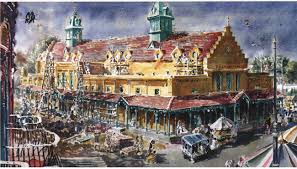 KK Aziz and the Coffee House of Lahore: Chris Moffat
KK Aziz and the Coffee House of Lahore: Chris Moffat
During a recent trip to Lahore, I visited the Sang-e-Meel bookshop on Lower Mall Road in search of K.K. Aziz’s The Coffee House of Lahore. Happily, the store was well stocked with the late historian’s final work, and I spent the afternoon reading the text at a table outside the nearby Tollinton Market.
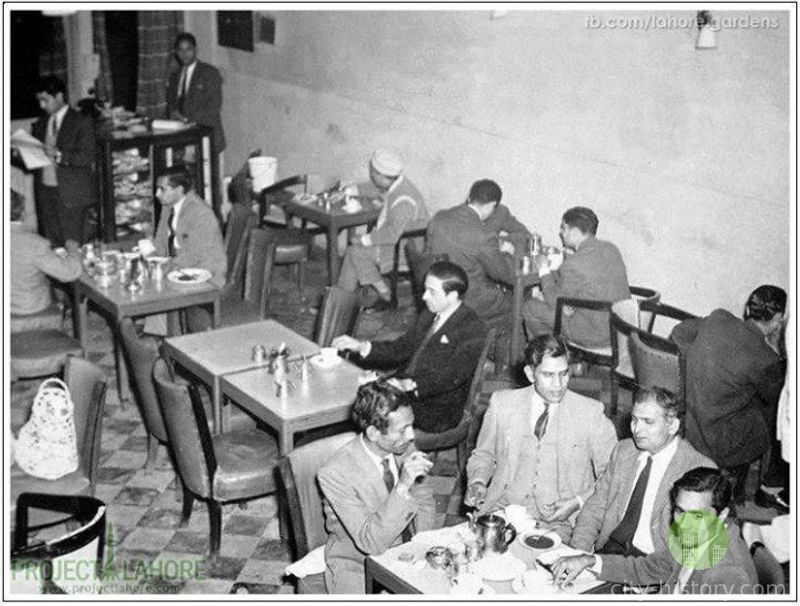 Book Excerpt: Coffee House of Lahore by KK Aziz
Book Excerpt: Coffee House of Lahore by KK Aziz
the 1920s onwards, perhaps since event earlier, Lahore was the most highly cultured city of north India. From here appeared the largest number of Urdu literary journals, newspapers and books and two of the best English language dailies. The Mayo School of Arts was flourishing. The Young Men Christian Association was active and its premises and hall were used by all communities for literary and social activities.
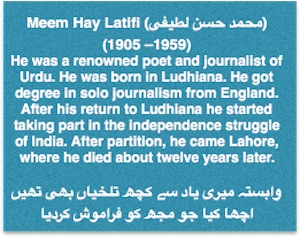 Muhammad Hasan Latifi: The Coffee House of Lahore by KK Aziz
Muhammad Hasan Latifi: The Coffee House of Lahore by KK Aziz
He was one of those remarkable men who arrived in Lahore in 1947 as a part of the flotsam & jetsam of the partition of the Punjab. His acute sufferings began with the ravages of the great migration & ended with his death 12 years later. The story of his life needs to be told in some detail.
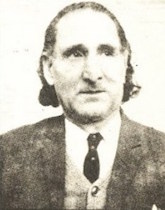 Zaheer Kashmiri: The Coffee House of Lahore by KK Aziz
Zaheer Kashmiri: The Coffee House of Lahore by KK Aziz
A flamboyant personality, consciously outrageous, bent upon having his say on the subject of his choice, and colourful in his deportment and dress. but all this served as an outer cover (perhaps a disguise) for a heart palpitating on the plight of the oppressed and a soul full of fellowship in sorrow… As an Urdu poet his reputation stands high.
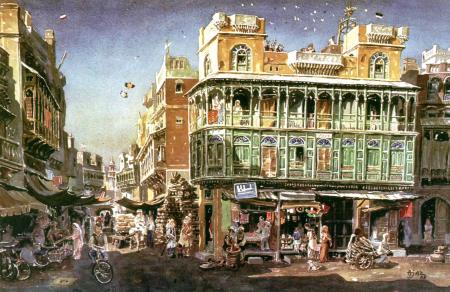 Arab Hotel Lahore: KK Aziz and A Hameed
Arab Hotel Lahore: KK Aziz and A Hameed
No description of the cultural life of Lahore can be complete without mentioning the Arab Hotel. Once the old-fashioned baithaks (sitting rooms of the orient) had gone out f use, the literati wanted a pace where they could meet, eat and talk. For those ‘orientalists’ of the 1920s the Mall was too Westernized, distant and costly. By chance they started patronizing a small, unclean restaurant on Railway Road, opposite the gate of the Islamia College.
